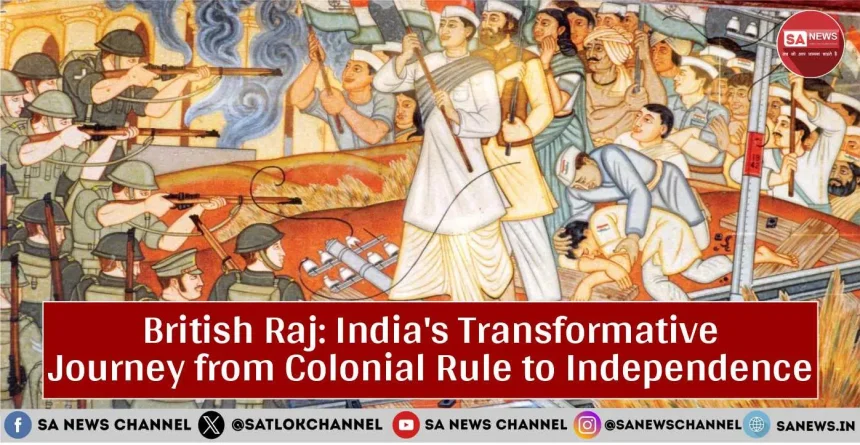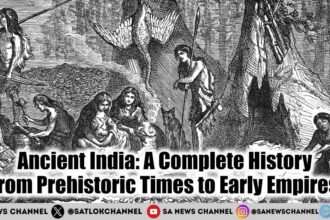British Raj: The British Raj, a transformative period in Indian history from 1757 to 1947, ushered in an era of direct British rule that reshaped the subcontinent. This epoch introduced Western education and legal systems, while simultaneously fostering a unified national identity.
- British Raj: The Role of East India Company
- The Indian Rebellion of 1857: Establishment of the British Raj
- Governance and Administration structure under Britishers
- Economic, Social and Cultural impact on India
- Nationalist Movements and Struggle for Independence: Rise of Nationalism
- The End of British Raj and Partition of India
- Conclusion: From Political Freedom to Spiritual Liberation
- Connect With Us on the Following Social Media Platforms
- 1. Why is British India called Raj?
- 2. Who is the father of the history of British India?
- 3. Who was the first British in India?
- 4. Who first opposed the British in India?
- 5. Who was the Lord of British India?
- 6. Who formed British India?
- 7. Who ruled India first before the British?
- 8. Why did Britain want India?
- 9. Was India rich before British rule?
- 10. Which queen ruled over India under the British Raj?
- 11. Who was the last British of India?
- 12. Who was the last British king of India?
The Raj’s impact remains a multifaceted legacy, encompassing economic exploitation, cultural exchange, and the germination of India’s independence movement. Comprehending this period is essential for understanding modern India’s socio-political landscape and its journey toward sovereignty.
British Raj: The Role of East India Company
British Raj: The East India Company, established in 1600, initially focused on trade but gradually expanded its influence. It secured trading rights and established factories in key locations such as Surat and Madras. The Battle of Plassey in 1757 marked a turning point, as the Company’s victory over the Nawab of Bengal granted it control over Bengal and its revenues, signaling the onset of Company rule in India.

Over time, the East India Company assumed administrative and military functions, effectively becoming the de facto ruler of vast Indian territories. Through a series of wars and treaties, the Company solidified its dominance and expanded its territorial control.
The Indian Rebellion of 1857: Establishment of the British Raj
British Raj: The Indian Rebellion of 1857, also known as the Sepoy Mutiny or the First War of Independence, catalyzed the establishment of the British Raj. This widespread but ultimately unsuccessful uprising against the East India Company’s rule stemmed from various factors, including resentment over British social reforms, economic exploitation, and territorial annexations. The rebellion ignited in Meerut and rapidly spread to other regions, including Delhi, Kanpur, and Lucknow.
In response to this upheaval, the British government assumed direct control of India from the East India Company. On November 1, 1858, Queen Victoria issued a proclamation transferring India’s administration to the British Crown, marking the inception of the British Raj and direct British rule.
■ Also Read:How Vivekanand’s Timeless Teachings Inspire Youth?
Governance and Administration structure under Britishers
British Raj: The British administration in India rested on three primary pillars: the Civil Service, the Army, and the Police. The Viceroy, appointed by the British monarch, held supreme authority over India’s governance. The country was divided into provinces, presidencies, and princely states, each managed by British officials. District collectors oversaw local administration.

Key policies and reforms included the Permanent Settlement (Zamindari system), aimed at streamlining land revenue collection but often resulting in peasant exploitation. The Ryotwari and Mahalwari systems were alternative land revenue systems implemented. The British also reformed the judiciary, established a police system, and introduced the Indian Civil Services to administer the country.
Economic, Social and Cultural impact on India
British rule precipitated significant economic, social, and cultural changes in India.
Economic Impact :-
The British exploited India’s resources, prioritizing raw material extraction and flooding the Indian market with British goods. This led to the decline of traditional industries like textiles and handicrafts. The introduction of cash crops and heavy taxation disrupted local economies and exacerbated widespread poverty.
Social Impact :-
British policies initiated social reforms, including the abolition of practices like sati (widow burning) and child marriage. However, these changes often served British interests rather than genuine concern for Indian society. The introduction of Western education created a new class of English-educated Indians, which eventually played a crucial role in the independence movement.
Cultural Impact :-
The British introduced Western cultural elements, including the English language, which became a unifying medium for educated Indians. They established institutions like universities and museums, influencing Indian intellectual and cultural life. However, British rule also contributed to the erosion of traditional Indian culture and values.
Nationalist Movements and Struggle for Independence: Rise of Nationalism
British Raj: Indian nationalism emerged in the late 19th century as a response to British colonial rule. The formation of the Indian National Congress (INC) in 1885 marked a significant milestone, providing a platform for Indians to voice their demands for self-governance. Early nationalists like Dadabhai Naoroji and Bal Gangadhar Tilak laid the foundation for the movement.

Key figures in the independence movement included:-
British Raj: Key figures in the independence movement included Mahatma Gandhi, Jawaharlal Nehru, Subhas Chandra Bose, and Sardar Vallabhbhai Patel. Bhagat Singh, and his associates Shivaram Rajguru and Sukhdev Thapar, were also prominent revolutionaries.
Major events included against British Rule:-
- The Non-Cooperation Movement (1920-22)
- The Civil Disobedience Movement (1930-34), and the Quit India Movement (1942).
- The Jallianwala Bagh Massacre in 1919 served as a turning point, galvanizing Indian resistance against British rule.
Mahatma Gandhi played a pivotal role in the independence movement. He introduced the principles of Satyagraha (non-violent resistance) and mobilized millions through peaceful protests.
Under his leadership, the INC transformed from an elite organization into a mass movement. Gandhi’s campaigns, such as the Salt March in 1930, highlighted the injustices of British policies and united Indians across diverse backgrounds.
The End of British Raj and Partition of India
World War II’s economic strains and mounting pressure from Indian nationalist movements made it increasingly difficult for the British to maintain control over India. The relentless efforts of leaders like Mahatma Gandhi and Jawaharlal Nehru, who spearheaded the struggle for independence, further intensified the demand for freedom. Realizing that holding onto India was no longer feasible, the British decided to relinquish control.

On August 15, 1947, the British Raj officially concluded with the passage of the Indian Independence Act by the British Parliament. This act led to the partition of British India into two independent dominions, India and Pakistan. The transfer of power marked the end of nearly 200 years of colonial rule and the beginning of self-governance for millions of people.
Conclusion: From Political Freedom to Spiritual Liberation
While India gained independence from British rule, many remain bound by superstition, hypocrisy, outdated rituals, and practices that contradict holy scriptures. True freedom extends beyond political sovereignty to spiritual enlightenment.
To break free from these mental shackles and discover authentic spiritual knowledge, readers are encouraged to explore books like “Gyan Ganga” and “Way of Living” by Sant Rampal Ji Maharaj. These texts offer insights into genuine worship and spiritual practices, potentially liberating individuals from misconceptions that persist long after colonial rule ended. By combining historical understanding with spiritual wisdom, one may find a path to holistic freedom – both external and internal.
Connect With Us on the Following Social Media Platforms
For More News & Updates Visit SA News.
1. Why is British India called Raj?
“Raj” means “rule” in Hindi.
2. Who is the father of the history of British India?
James Mill.
3. Who was the first British in India?
British East India Company.
4. Who first opposed the British in India?
Sannyasins and Fakirs of Bengal.
5. Who was the Lord of British India?
The Viceroy.
6. Who formed British India?
British Crown.
7. Who ruled India first before the British?
Mughal Empire.
8. Why did Britain want India?
For trade and resources.
9. Was India rich before British rule?
Yes, very rich.
10. Which queen ruled over India under the British Raj?
Queen Victoria.
11. Who was the last British of India?
Louis Mountbatten.
12. Who was the last British king of India?
George VI.









